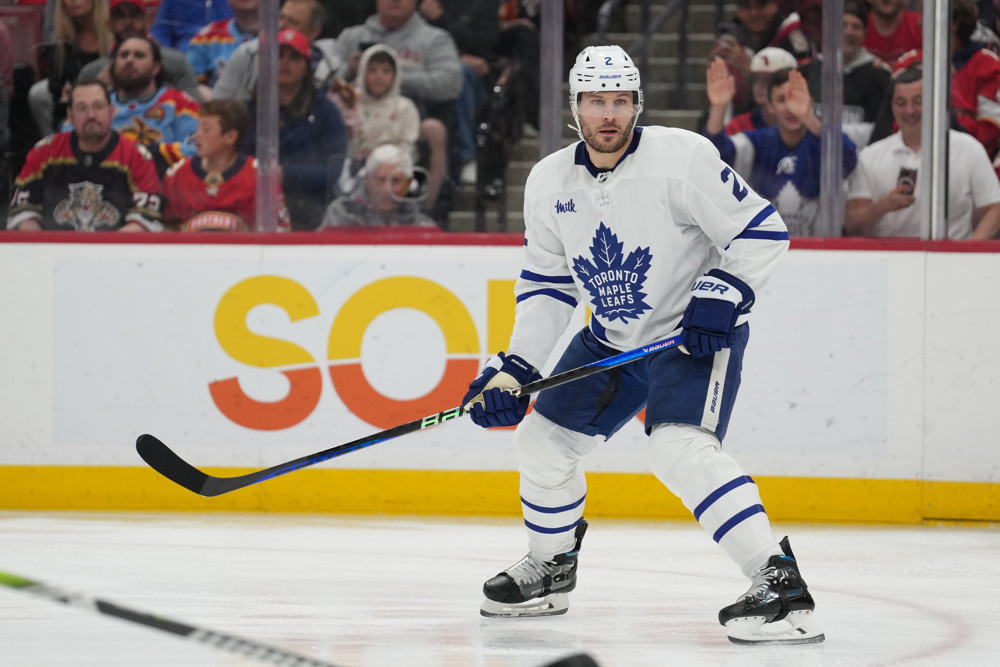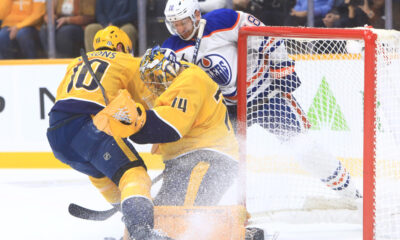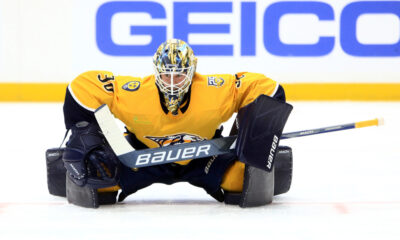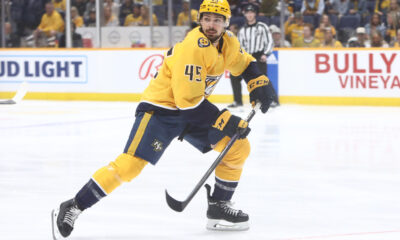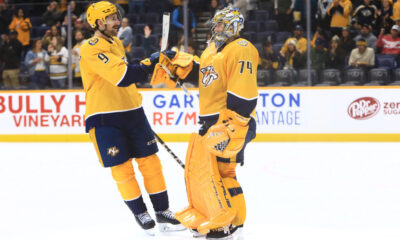The Nashville Predators’ signing of defenseman Luke Schenn raised more than a few eyebrows across Smashville. A three-year, $2.75 million AAV contract for a 33-year-old who was in the minors just a few years ago seemed counterintuitive to the types of value deals Barry Trotz previously stated he was looking for in this year’s free agent market.
And yet, Schenn checked a lot of boxes in Trotz’s eyes. He adds size and physicality to the blueline, something Trotz stated he wanted to do. And with two Cup rings, contributes to the shift in “culture” Trotz harped on during his free agency press conference last week.
“If you meet Luke as a human, you’ll find out that this is a guy that gets it culturally,” Trotz says of Schenn. “He gets it as a teammate. He gets it as a person in the community.”
Culture is important, but so are on-ice results, something that’s been a tricky tenure over the course of Schenn’s career. After establishing himself as a stay-at-home top four defenseman with the Maple Leafs and Flyers in the early 2010s, Schenn’s career took a downward turn, and found himself in the minors during the 2019 and 2020 seasons.
Luke Schenn Year-by-Year Stats
| Year | Team | GP | G | A | P | PIM | Hits | Blks | CF% |
| 2018-19 | ANA/VAN | 26 | 0 | 2 | 2 | 16 | 105 | 39 | 41.6% |
| 2019-20 | TB | 25 | 1 | 2 | 3 | 23 | 83 | 83 | 43.8% |
| 2021 | TB | 38 | 2 | 2 | 4 | 51 | 99 | 17 | 53.0% |
| 2021-22 | VAN | 66 | 5 | 12 | 17 | 61 | 273 | 96 | 45.6% |
| 2022-23 | VAN/TOR | 70 | 4 | 18 | 22 | 84 | 318 | 98 | 41.7% |
But a late-season call-up to the Tampa Bay Lightning in 2020 helped jumpstart his road back to a regular NHL job. Schenn served as a rotational, depth defenseman during the Lightning’s two Cup runs, where despite playing in a limited amount of games, was used in critical moments in meaningful playoff games. He parlayed that into a two-year contract with the Vancouver Canucks, where a partnership with Quinn Hughes led to Schenn’s best two statistical seasons in over a decade, including a career-high 22-point season last year. He impressed again in a post-deadline stint with the Leafs, serving as a reliable partner for Morgan Rielly.
The Predators are banking big on Schenn being able to continue that high level of play while playing in a similar role in Nashville, perhaps alongside Roman Josi. The question is how exactly will Schenn fit in with Trotz and Andrew Brunette’s faster, more up-tempo style of play?
What Schenn Brings to the Predators
As critics of this signing have pointed out, Schenn isn’t exactly known for his elegant skating. And true, if he’s expected to skate stride-for-stride with Nathan MacKinnon or Connor McDavid, that’s going to cause problems. That being said, Schenn isn’t a pylon either. What he lacks in pure speed and agility he makes up with the ability to react to plays quickly. And at 6’2″, he has the length to limit opponents’ space, whether that be via his active stick or stepping up to close the gap between him and an oncoming skater.
Of course, often times that “closing the gap” leads to another big aspect of Schenn’s game, his hitting. Schenn led the NHL in hits last season with 318, and twice last year set the Canucks’ single-game record for hits with 12. How much you actually value that skillset probably depends on your individual taste and opinions of the game. However, it was enough of a draw for Trotz to specifically highlight it during his free agency press conference, saying Schenn’s penchant for hitting may discourage opponents’ from getting too physical with players like Roman Josi.
The one difference with Schenn is that a decent chunk of his hits are more of the “Niklas Kronwall” variety and less of the “just smash a guy into the boards a split second after he releases the puck” variety that have become a staple of the Preds these past couple of seasons. Schenn likes to step up into the play and take his shot at puck carriers. When it works, it can lead to highlight reel moments like last season’s bit hit on Matthew Tkachuk. When it doesn’t, it sometimes leads to his defense being prone to odd-man chances.
Offensively, Schenn’s production will likely depend on the production of those on the ice with him. As mentioned, he managed to score 22 points (4 goals, 18 assists) last season, which tied his career high set in 2012 (and – as it should be noted – would have made him the third-highest scoring Preds’ blueliner behind Josi and Tyson Barrie last year.) A lot of those points came while playing on Vancouver’s top units, alongside the likes of Hughes, Elias Pettersson, J.T. Miller, and Andrei Kuzmenko. Although it should be noted that 11 of Schenn’s 18 assists were primary assists, so it’s not as if he was the group project team member that did nothing, but still got the grade. Every once in a while, you’ll see him make a heady, good-awareness play like the one below to set up a good scoring chance. But again, his offensive impact is going to be minimal, and his statistics are going to be reliant on how well his teammates do.
One concern, in terms of usage, is that Schenn isn’t the “minute muncher” you would hope to have in your top four on the blueline. He averaged just over 16 minutes of ice time last season and only played more than 20 minutes in two of his 70 games last season. In general, Schenn has been at his most effective when used in smaller doses, including limited penalty killing minutes. That’s not necessarily a bad thing for certain players, but for the type of contract the Preds are giving Schenn, there may be an expectation to contribute more often in more situations.
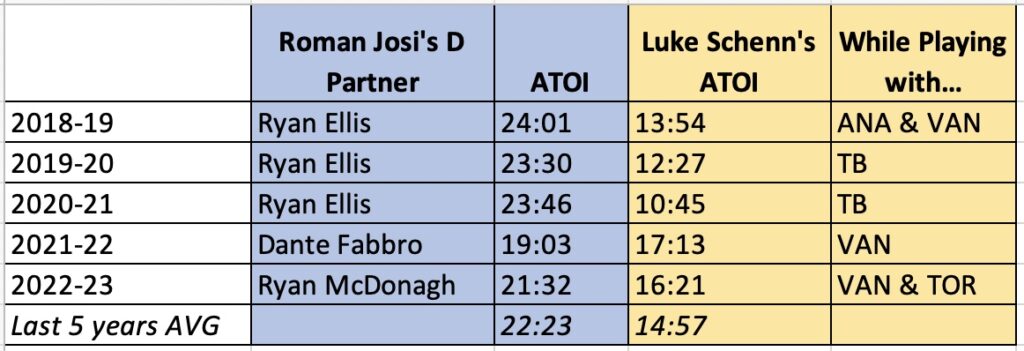
Schenn’s Fit on the Predators
Based on the amount of times we’ve been reminded Luke Schenn played alongside Hughes and Rielly this past season, and based on Trotz mentioning “protection” for Roman Josi, the reasonable conclusion is that the Predators envision Schenn as a partner for their captain, at least at 5-on-5.
By no means would it be the classic “double-threat” top pairing that Preds fans got used to seeing in Weber-Josi or Josi-Ellis, and Schenn’s low-end offense may require some line shuffling late in the game in certain situations (like when the Preds are a goal behind.) But the hope is that Schenn can be reliable enough defensively to allow Josi to be more an aggressive, free-flowing playmaker for the bulk of the game.
If that doesn’t pan out, or if another player like Alexandre Carrier or Dante Fabbro better excels in that spot, then Schenn should at the very least be a decent depth option for the Preds. It would be a fairly expensive price tag for a player in that type of role, but considering how much uncertainty there is with the defensive roster currently, that’s an issue Trotz can address when the season is over.

